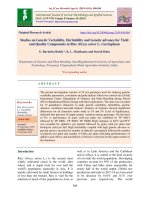Specific combining ability analysis for grain yield and its components in post rainy sorghum
Bạn đang xem bản rút gọn của tài liệu. Xem và tải ngay bản đầy đủ của tài liệu tại đây (169.06 KB, 6 trang )
Int.J.Curr.Microbiol.App.Sci (2020) 9(8): 2304-2309
International Journal of Current Microbiology and Applied Sciences
ISSN: 2319-7706 Volume 9 Number 8 (2020)
Journal homepage:
Original Research Article
/>
Specific Combining Ability analysis for Grain Yield and its
Components in Post Rainy Sorghum
Shailesh M. Gawande*, Vikram V. Kalpande and Sunil B. Thawari
All India Coordinated Sorghum Improvement Project, Akola Centre, Sorghum Research Unit,
Dr. Panjabrao Deshmukh Krish iVidyapeeth, Akola – 444001 (M.S.), India
*Corresponding author
ABSTRACT
Keywords
Combining ability
analysis, Line x
tester, SCA,
Sorghum, Standard
heterosis
Article Info
Accepted:
20 July 2020
Available Online:
10 August 2020
Five lines and ten testers were crossed in line x tester design to produce 50
cross combinations and were evaluated along with the check for grain yield
and its components for combining ability analysis. The study revealed that
out of the fifty hybrids, thirteen hybrids revealed positive significant SCA
effects along with positive significant standard heterosis for grain yield per
plant. Hybrid AKRMS-80-1A (39) x PKV-Kranti recorded the highest
positive significant SCA effects (25.93**) along with positive significant
standard heterosis (19.72**) for grain yield/plant. All these crosses need to
be evaluated on large scale multilocation and multiseason trials to find out
the most stable cross combination for higher grain yield in rabi sorghum.
desirable and significant standard heterosis
for grain yield per plant.
Introduction
Post rainy (Rabi) sorghum is dual purpose
crop with best grain quality and fodder quality
and hence fetches good market price. Post
rainy sorghum is mostly taken on the residual
soil moisture. The study was undertaken to
estimate the specific combining ability effects
in post rainy sorghum hybrids which in turn
helped in identification of the potential cross
combinations for yield and its components in
post rainy sorghum. Promising cross
combinations were sorted out based on the
specific combining ability along with the
Materials and Methods
The experimental material comprised of five
male sterile lines viz., AKRMS-66-2A(38),
AKRMS-66-2A(40),
AKRMS-66-2-3A,
AKRMS-80-1A(39) and AKRMS-80-11A(62) and ten testers viz., SLR-136, SLR137, Elangovan-35, AKSV-252,Rb-Local-11-sel-1, Rb-Local-5 (Bold), RSV-962,AKSV330, PKV-Kranti and AKSV-370. These
fifteen genotypes were crossed in line x tester
2304
Int.J.Curr.Microbiol.App.Sci (2020) 9(8): 2304-2309
fashion. Fifteen parents and their resulting 50
hybrids along with one standard check CSH19R were sown at Sorghum Research Unit,
Dr. P.D.K.V. Akola in randomized block
design with three replications. The
observations were recorded on five randomly
selected plants per plot per replication for
plant height (cm), panicle length (cm), panicle
breadth (cm), number of primaries/ panicle,
number of grains/ panicle, 1000 seed weight
(g) and grain yield/ plant (g). The standard
heterosis was estimated as per cent increase or
decrease of the mean of F1 over the value of
the standard check CSH 19 R. The data on all
the above characters were subjected to
combining ability analysis by following
Kempthorne (1957) method.
The second hybrid AKRMS-66-2-3A x SLR136 exhibited desirable significant SCA
effects for grain yield per plant (20.37**)
along with all other component characters
except plant height. The SCA effects were
8.55** for number of primaries, 2.73** for
panicle length, 0.71** for panicle breadth and
4.22** for 1000 seed weight.
Third cross AKRMS-80-1A (39) x
Elangovan-35 exhibited positive significant
SCA effects for grain yield per plant
(13.43**) along with all other component
characters except for panicle length and
panicle breadth. Total thirteen crosses
exhibited positive significant SCA effects
along with positive significant standard
heterosis for grain yield per plant.
Results and Discussion
Analysis of variance showed that the mean
squares due to genotypes were highly
significant for all the traits studied under this
investigation (Table 1). This indicated the
presence of substantial genetic variability for
these characters. Further partitioning of
genotypic variance into components viz.,
parents, hybrids and parents vs. hybrids
revealed that the parents differed among
themselves significantly for grain yield per
plant. Analysis of variance for combining
ability is presented in Table 2. It is revealed
that crosses exhibited significant variation for
grain yield as well as all the component traits.
The male x female interaction was also
significant. Among the 50 hybrids in the
present
investigation,
thirteen
cross
combinations exhibited positive SCA effects
for grain yield per plant along with some of
the component characters (Table 3). The
hybrid AKRMS-80-1A x PKV-Kranti
(25.93**)
exhibited
highest
positive
significant SCA effects for grain yield per
plant along with all other component
characters.
Ghorade et al., (2016) reported ten promising
cross combination based on positive
significant SCA effects for grain yield per
plant.
Kalpande et al., (2016) also reported three
promising crosses based on positive
significant SCA effects for grain yield per
plant. Thus it was also observed that thirteen
crosses exhibited positive significant SCA
effects accompanied with positive significant
standard heterosis for grain yield per plant. It
is very well known that if SCA variance,
which is a measure of non-additive genetic
variance, is high for a character and also
observed heterosis is also high, such crosses
can be utilized for commercial exploitation of
heterosis.
Similarly, it was also observed from the Table
3 that high heterotic crosses exhibited
significant SCA effects with higher per se
performance. Similar relationship was also
noticed by Prabhakar (2013) in rabi sorghum.
However Patil and Bapat (1991) reported that
high SCA was not reflected in high heterosis.
2305
Int.J.Curr.Microbiol.App.Sci (2020) 9(8): 2304-2309
Prakash et al., (2010), Prabhakar et al.,
(2013),Ghorade et al., (2014b) and Kalpande
et al., (2015c) also reported such promising
crosses based on SCA, heterosis and mean
performance.
Kalpande et al., (2016d) reported seventeen
promising cross combinations based on
positive significant SCA effects for grain
yield per plant along with some of the
component characters.
Gunjal (2014) also reported fourteen
promising crosses with positive significant
SCA effects along with positive significant
standard heterosis in his study.
Ghorade et al., (2018) reported the cross
combination AKMS 90 A x AKR 337 with
highest significant standard heterosis as well
as highest significant SCA effects for grain
yield per plant.
Table.1 Analysis of variance of parents and hybrids for various characters
under Line x Tester analysis
Source of
Variation
d.f.
2
64
14
4
9
1
Plant
Number of
Height (cm) primaries
per cob
9.89
2.72
3340.27**
263.78**
2741.95**
174.46**
154.44**
401.16**
547.24**
84.59**
32844.3617** 76.54**
Panicle
Length
(cm)
1.68
11.28**
8.96**
9.99**
9.26**
2.19
Replications
Genotypes
Parents
Females
Males
Females vs
Males
Hybrids
Parents vs
Hybrids
Error
49
1
3565.7858**
666.56**
277.41**
846.26**
11.58**
29.02**
128
20.23
6.57
1.98
Panicle
breadth
(cm)
0.11
1.22**
0.28*
0.31
0.29*
0.007
Number of 1000 Seed
Grains/ Weight (g)
Panicle
814.74
2.27
571863.91** 85.30**
215933.56** 83.48**
233073.87** 121.34**
226876.72** 74.31**
48883.86** 14.48*
Grain
Yield/
Plant (g)
1.26
566.34**
296.44**
598.69**
165.29**
267.73**
1.51** 678127.736** 83.41** 651.57**
0.015 347961.26** 203.78** 168.86**
0.14
4526.13
2.49
7.62
Table.2 Analysis of variance for combining ability for various characters
Source of
Variation
d.f.
Replications
Crosses
Lines
Testers
Line x Tester
Error
2
49
4
9
36
98
Plant
Height
(cm)
Number Panicle
of
Length
Primaries (cm)
per cob
11.198
15.020
1.958
3565.786 ** 277.418 ** 11.585 **
12546.210 ** 416.333
13.590
3579.973
355.456
9.845
2564.414 ** 242.474 ** 11.797 **
20.770
7.347
2.122
Panicle
Breadth
(cm)
0.138
1.516 **
1.353
1.701
1.488 **
0.164
* - significant at 5% level of significance ** - significant at 1% level of significance
2306
Number
of
Grains/
Panicle
6158.657
678127.800 **
2222591.000 **
857341.700
461717.200 **
3670.258
1000
Grain
Seed
Yield/
Weight Plant (g)
(g)
2.382
2.064
83.414 ** 651.575 **
51.456 2291.907 **
149.956 881.244
70.330 ** 411.899 **
2.538
8.735
Int.J.Curr.Microbiol.App.Sci (2020) 9(8): 2304-2309
Table.3 SCA effects of promising hybrids for grain yield per plant
S.N
Crosses
Mean
for
SCA
Grain effects for
yield grain yield
/ plant
(g)
66.42
25.93**
1
AKRMS-80-1A(39)
X PKV-Kranti
2
AKRMS-66-2-3A X
SLR-136
69.17
3
AKRMS-80-1A(39)
X Elangovan-35
4
5
6
7
8
9
10
Standard GCA effect with
Heterosis type of parents for
for grain
grain yield
yield (%)
19.72**
-2.72**
X -4.68**
LL
20.37**
24.67**
3.56** X -2.65**
HL
66.76
13.43**
20.32**
-2.72** X 8.15**
LH
AKRMS-80-11A(62) x
Rb-Local-1-1-sel-1
67.46
13.05**
21.59**
-9.14**
X 15.66**
LH
AKRMS-66-2-3A X
Rb- Local -5(Bold))
AKRMS-66-2-3A X
AKSV-370
AKRMS-66-2A(38)
X
SLR-137
63.42
10.44**
14.30**
65.36
10.38**
17.80**
72.21
10.22**
30.15**
3.56** X 1.52*
HH
3.56** X 3.52**
HH
13.30** X 0.17
HH
AKRMS-66-2A(40)
X
Rb-Local-1-1-sel-1
AKRMS-66-2A(38)
X
RSV-962
AKRMS-80-1A(39)
X
Rb-Local-1-1-sel-1
68.00
9.45**
22.57**
65.26
9.32**
17.61**
69.87
9.04**
25.93**
11
AKRMS-66-2-3A X
Elangovan-35
68.52
8.91**
23.50**
12
AKRMS-66-2A(38)
X
Rb-Local-5(Bold)
AKRMS-66-2A(38)
x
AKSV-370
68.92
6.19**
24.21**
69.91
5.19**
26.01**
13
-5.01**
15.66**
LH
13.30**
5.26**
HL
-2.52**
15.66**
LH
Desirable significant SCA effects for
component traits
plant height, panicle length,, panicle
breadth, number of primaries/ panicle,
number of grains/ panicle, 1000 seed
weight
panicle length,, panicle breadth, number of
primaries/ panicle, number of grains/
panicle, 1000 seed weight
plant height, number of primaries/ panicle,
number of grains/ panicle, 1000 seed
weight
plant height, panicle length,, panicle
breadth, number of primaries/ panicle,
number of grains/ panicle, 1000 seed
weight
panicle length, number of primaries/
panicle, number of grains/ panicle
number of primaries/ panicle
plant height, panicle length,, panicle
breadth, number of primaries/ panicle,
number of grains/ panicle, 1000 seed
weight
X panicle breadth, 1000 seed weight
- plant height, number of primaries/ panicle,
number of grains/ panicle, 1000 seed
weight
X plant height, panicle length,, panicle
breadth, number of primaries/ panicle,
number of grains/ panicle, 1000 seed
weight
3.56** X 8.15** plant height, panicle breadth, number of
HH
primaries/ panicle, number of grains/
panicle, 1000 seed weight
13.30** X 1.52* plant height, panicle length,, number of
HH
primaries/ panicle, number of grains/
panicle
13.30**
X panicle breadth, number of primaries/
3.52**
panicle, number of grains/ panicle, 1000
HH
seed weight
* - significant at 5% level of significance ** - significant at 1% level of significance
2307
X
Int.J.Curr.Microbiol.App.Sci (2020) 9(8): 2304-2309
For grain yield per plant, out of the total
thirteen hybrids, six hybrids involved high x
low type of GCA value of parents involved in
the crosses while six cross combination
involved high x high type of GCA value of
the parents and one cross combination
involved low x low type of GCA value of the
parents
Ravindrababu et al., (2001) and Ghorade et
al., (2014) also reported that some of the
promising hybrids involved high x low GCA
parental lines. However Hariprasanna et al.,
(2012) reported that some of the crosses with
positive significant SCA for grain yield
involved even low x low combination of
parents.
Gunjal (2014) also reported that out of the
total sixteen promising hybrids, eleven
hybrids involved high x low type of GCA
value of parents involved in the crosses while
five cross combination involved low x low
type of GCA value of the parents.
Thus it was concluded from the present study
that total thirteen cross combinations recorded
positive significant SCA effects along with
positive significant standard heterosis for
grain yield per plant and hence appeared to be
best for further exploitation. These crosses
need to be evaluated on large scale
multilocation and multiseason trials to find
out the most stable cross combination for
higher grain yield in rabi sorghum.
References
Ghorade et al., (2014). Combining ability
analysis for drought tolerance and grain
yield in rabi sorghum. International
Journal of Agricultural Sciences
10(1):344-347.
Ghorade et al., 2016). Specific combining
ability for grain yield and yield
components in rabi sorghum under
drought condition. National Conference
on Genetics and Cytogenetisc, 1-3
February, Dharwad, India, pp-67-68.
Ghorade et al., (2018). Assessment of newly
developed diverse parental lines in
sorghum through combining ability. Int.
J. Curr. Microbiol. App. Sci. 6: 19921998.
Gunjal, S.M. (2014). Heterosis and combining
ability studies in rabi sorghum. M.Sc.
(Agri.). Unpub. Thesis, Panjabrao
Deshmukh Krishi Vidyapeeth, Akola.
Hariprasanna, K., Rajendrakumar P. and Pati
lJ.V. (2012).Parental selection for high
heterosis in sorghum (Sorghum bicolor
(L.)
Moench)-Combining
ability,
heterosis and their relationship. Crop
Res., 44(3):400-408.
Kalpande et al., (2015).Combining ability
analysis for grain and fodder yield in
post rainy sorghum. Plant Archives,
Vol.15 No.1, 2015 pp.105-107.
Kalpandeet.al. (2016). Specific combining
ability effects for grain yield and yield
contributing traits in post rainy
sorghum. Int. Conference on Plant Res.
and Resource Mgt., 11-13 February
2016, Baramati (MS) India, pp-63.
Kempthorn O. (1957). An Introduction to
genetic statistics. John Willey and Sons.
Increased. New York, 468-470
Patil, F.B. and Bapat D.R. (1991). Stability
parameters in sorghum. J. Maharashtra
Agric. Univ., 16(1): 13-15.
Prabhakar et al., (2013).Combining ability of
new parental lines for flowering,
maturity and grain yield in rabi
sorghum. Electronic J. of Plant
Breeding, 4(3): 1241-1218.
Prakash et al., 2010). Combining ability for
fodder yield and its components in
sorghum (Sorghum bicolor (L.)
Moench). Electronic Journal of Plant
Breeding.1 (2):140-144.
2308
Int.J.Curr.Microbiol.App.Sci (2020) 9(8): 2304-2309
How to cite this article:
Shailesh M. Gawande, Vikram V. Kalpande and Sunil B. Thawari. 2020. Specific Combining
Ability analysis for Grain Yield and its Components in Post Rainy Sorghum.
Int.J.Curr.Microbiol.App.Sci. 9(08): 2304-2309.
doi: />
2309
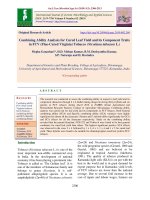
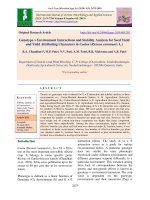
![Studies on correlation and path analysis for grain yield and quality components in foxtail millet [Setaria italica (L.) Beauv.]](https://media.store123doc.com/images/document/2020_01/09/medium_dyd1578574836.jpg)
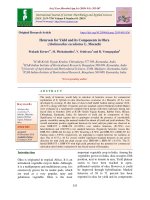
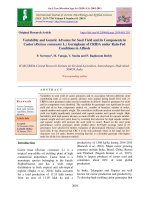
![Genetic diversity and principal component analysis for grain quality and productivity traits in sorghum [Sorghum bicolor (L.) Moench]](https://media.store123doc.com/images/document/2020_03/11/medium_9zfcp8Rpji.jpg)
